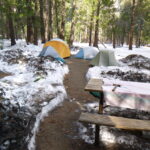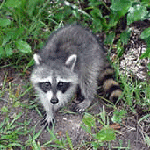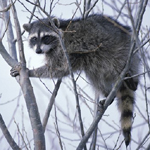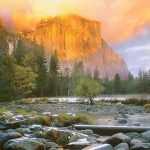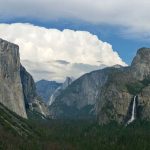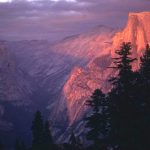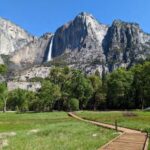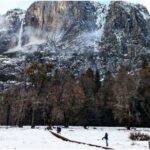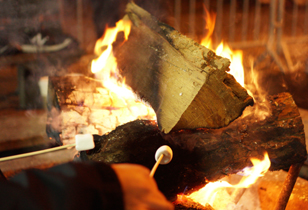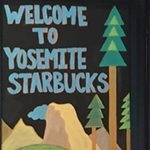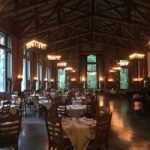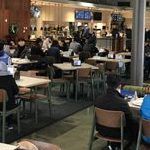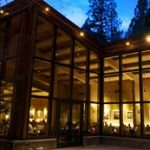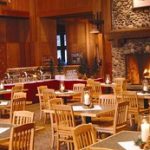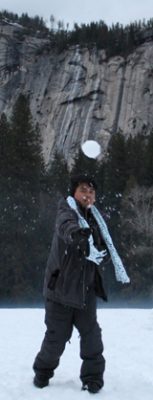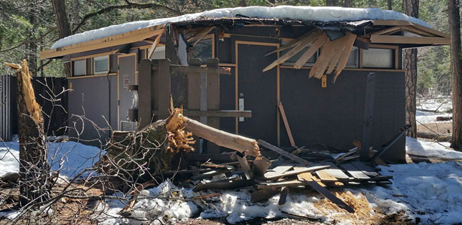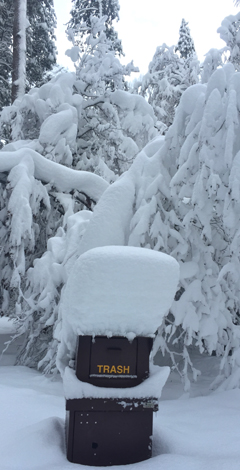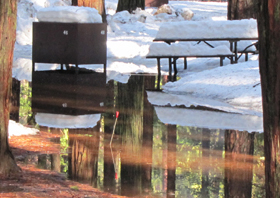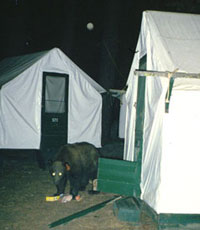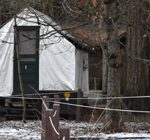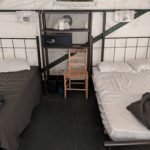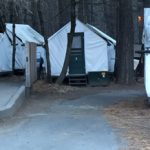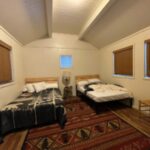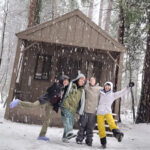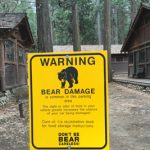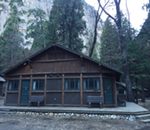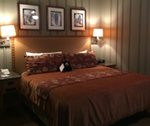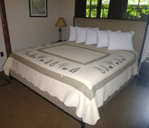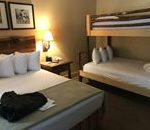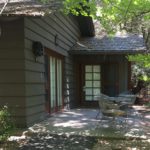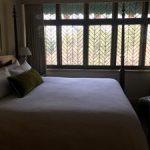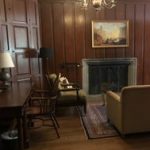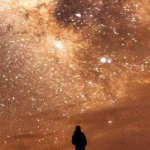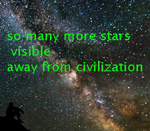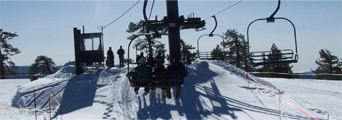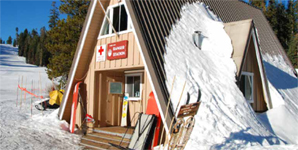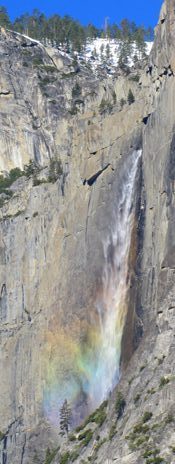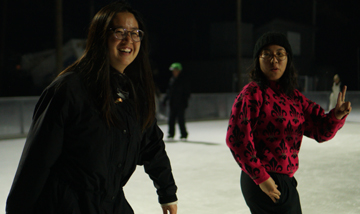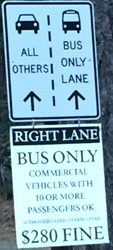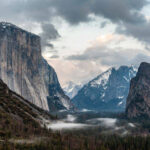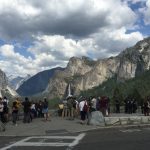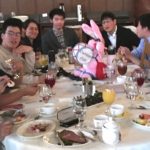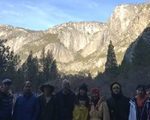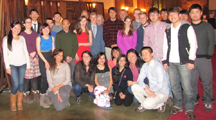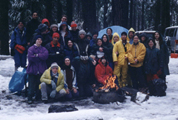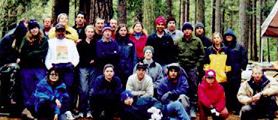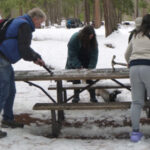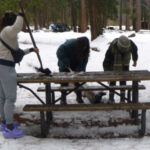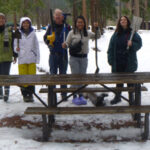We are planning for a 2027 winter quarter weekend trip to Yosemite National Park on Jan. 29 to 31.
This webpage will be updated further closer to the next trip.
– – – – – – – – – – – – – – – – – – – – – – – – – – – – – – – – – – – – – – – – – – – – – – – – – – – – – – – – – –
The weekend of Friday, Jan. 30 – depart Sunday, Feb. 1, 2026 was the
De Anza College Outdoor Club
THIRTY-SIXTH ANNUAL Yosemite Valley winter trip
After reading this webpage, the main links you probably need are:
things to do in advance of the trip which includes details about choices of where you can stay overnight, (besides camping, there are cabins/hotel rooms/wood floored canvas walled & roofed tent cabins) and how to check current prices and make a reservation.
and
How to sign up for the 2026 winter weekend Yosemite trip includes details about where / when to sign up, in person / on campus, and what to bring with you to the signup.
and see the trip agreement: https://marydonahue.org/yosemite-winter-trip-2026-trip-agreement
For the 2026 trip we have people who have been on the trip before and are experienced enough to lead the major hike, and others who can teach people to ice skate.
Some of these people will camp, some made hotel room type reservations well in advance of the trip. In mid September 2025, club members got seven large campsites in a group in Upper Pines Campground (the only Yosemite valley campground open in the winter that you can park at your campsite) that they intend to share. Three of them are for the official days of the trip: arrive Friday, Jan. 30 – depart Sunday Feb. 1, 2026. Four of them are for longer-than-the-trip-dates: arrive Thursday, Jan. 29, depart Monday, Feb. 3. People could choose to extend them as they want. (Originally we wrote here: “If you want to get your own campsite, please do come to a club meeting, talk about it and get advice on how to do it.”) As of December 2025, all the campsites in Upper Pines are booked for the Jan. / Feb. weekend of our 2026 trip, so we are all thankful that people made reservations in advance to share.
If you want to have space in one of these campsites, make arrangements when you come to sign up and pay for the trip.
below, one of the campsites they got as seen on a previous trip:
see details about all overnight accommodations, and how to make reservations at: In Advance of the Yosemite Trip
_________________________________________________
![]()
You r-e-a-l-l-y need to read all this material before you come to sign up.
(First photo below courtesy of the park service.)
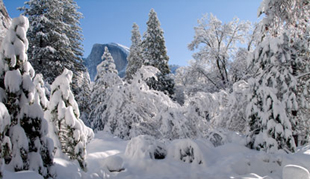
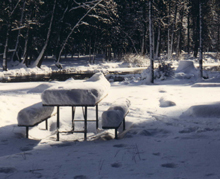
Usually one of our biggest trips. Rain? Snow? Sleet? Sunshine? Campfires! Coyotes!
Raccoons (quite possibly IN the tents or tent cabins if people are not careful about snacks in daypacks or their pockets)
raccoons know how to unzip your tent door.
– – – – – – – – – – – – – – – – – – – – – – – – – – – – – – – – – – – – – – – – – – – – – – – – – – – – – – – – – –
YOU CHOOSE which activities you want to do:
night hikes,
early morning hikes,
long hikes to viewpoints above the valley or to the top of one of the tallest waterfalls in the world,
Ranger nature walks,
ice skating,
snow sculpture building,
photo walk with a professional photographer, 9 a.m. Saturday
(which you need to sign up for in advance, used to be free but now they charge for it),
photo tour of you create the route for,
of places to photograph iconic Yosemite landmarks
using these links to webpages of locations to photograph
Yosemite Falls, Bridalveil Fall, El Capitan, Staircase Falls and Half Dome.
This could be a driving tour or
a walking / free shuttle bus tour of the east end Yosemite Valley. People can use the free shuttle bus. Stop at the Exploration Center, near free shuttle bus stop 5 and take a look at the museum and Exploration Center. At free shuttle bus stop 6 you can do a walk to the base of Yosemite Falls and do a short or long walk around Cook’s meadow. You might have done this walk/hike in the summer; you’ll find a quite different look in the winter, but can still have a great view of upper Yosemite Fall:
and of Half Dome:

A short walk with a Ranger naturalist could be included in these plans during years they have them.
People can do this by copying or downloading the locations-to-take-the-best-Yosemite-photos webpages linked to above and bringing them on the trip. Hmmmmmmm, and you might also want a copy of Things to do during a Yosemite snow storm besides hiding in your tent.
For
snowboarding/skiing (lessons and/or rentals),
Ranger Naturalist snowshoe walks,
![]()
People can do a 45+ minute drive with putting on tire chains likely required
or take the free bus to the ski resort
and let the bus driver deal with tire chains. (more details about the free bus below)
Possibly a Saturday evening campfire if people get a campsite or meet at a picnic area that has grills, etc., but often the Yosemite Falls hikers take all day and are tired and want a quick no-cook dinner (or pizza / cafeteria) and sleep instead of a campfire. (Wise people bring enough picnic-type-no-cook food that they can eat even if the restaurants have a power outage or they get back late from the all-day mega hike.)
If all the campers are elsewhere in the evening, but the ice skating is open, they often have a huge fire with seating around it:
Many years there is a 7 p.m. Ranger Evening Program at the Yosemite Lodge Cliff Room.

And since the faculty advisor can’t do all the activities listed above see below for what will be an official club activity:
The official club activities 2026 will likely be
– – a 7 a.m. (yup, at sunrise) Saturday morning (maybe including) coffee/tea/hot chocolate, (likely including snacks, see who wants to ski, who wants to hike, who wants to do the snowshoe walk if they offer it on a Staurday, plans-for-the-day-look-at-trail-maps-confirm-people-remembered-their-flashlight-and-rain-gear required meeting.
Where we meet will be determined closer to the start of the trip, after we see where people are staying overnight. We have previously met at Yosemite Lodge, (with a nearby free parking lot) where the free bus to the ski area has a pickup and close to the trailhead for the hike to the base of or the top of Yosemite Falls. For 2026, Curry Village is looking even better.
why 7 a.m.??
. . . because the longest hike takes all-day-and-sometimes-into-the-evening, so people need to get moving early.
. . . and because the free bus to the ski resort / ranger snowshoe walk leaves early (this bus is first-come, first served, no reservations and people have been turned away when the bus fills – ( but our trip members have always been in line early) see more about the bus and schedule later at this webpage in the section: Free bus to skiing, snowboarding, snowshoeing).
The 7 a.m. meeting may be the time most people finally decide what they are doing on Saturday.
– – and optional (but usually everybody – or most trip members)
a Sunday morning breakfast together
(This will be an official club activity, and the club will supply some food for it.
Trip members all usually bring food to share, but can come to the breakfast without contributing food.)
The club has always met on Sunday morning at the end of the trip to eat together and share photos and tales of hikes, skiing people did,
plan ahead for the next kayak lesson
and the August (between summer and fall quarters) trip to Grand Teton National Park.
We (many years everyone) usually got dressed up and went to the Ahwahnee hotel for the grand brunch.
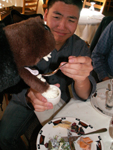
But they started remodeling the hotel dining room and in 2022, 2023, 2024 and 2025
we did our own pot-luck brunch that many of us preferred to the hotel brunch.
We plan again for 2026 to have a pot-luck breakfast the last morning and share tales of adventures.
In 2022, 2023, 2024, 2025 we thought we did a better menu than the hotel buffets and the club set aside some money for part of the food.
Details about signing up to bring whatever you would most like to eat, with enough to share, (chocolate, juices, fruit, pastries, pies, nuts, bagels and tooooo many choices of toppings, cheese plate, salami, . . . chocolate) will be discussed at various pre-trip meetings.
Nope, no homemade food and no cooking at the hotel, except perhaps roasting marshmallows over a candlelight flame:
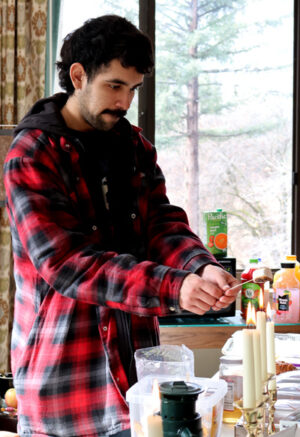
(Yup, in 2023 one woman left the huge bottle of juice at home in her fridge.)
Where we will meet to eat Sunday morning might be announced at the official pre-trip meeting (and last chance to sign up for the trip . . . date TBA). BUT it would be best to not wait until that late to sign up.
Because many students on the trip choose to stay overnight
in a hotel-type room or a wood floored canvas walled & roofed tent cabin,
and people who choose to camp will be in a campground with heated restrooms, showers nearby,
restaurants to bail to if cooking out doesn’t work,
and there is a 24 hour in-the-park ambulance service, this isn’t a true wilderness adventure.
But we have had someone on almost every trip who has never been in the snow
or has never been camping before
(or even both),
so for them it meets all definitions of an adventure.
(So they’ve never been in a snowball fight, either. Okay, yes, all activities are optional, including snowball fights.)
The new friends in these group photos
at the end of previous winter Yosemite trips
were mostly strangers when the trip started. (More group photos at the end of this webpage.)
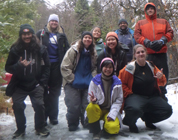
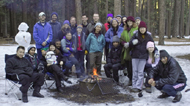
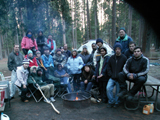
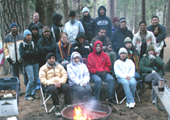
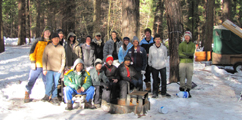
The club requires that we see your waterproof rain gear when you sign up,
because on previous trips
the faculty advisor has had to dress people in plastic leaf bags.
Really.
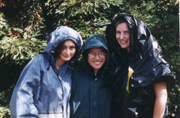
There are ideas for people on a budget at the complete description of what to bring at: Snow or rain camp must-haves You can rent a winter ski parka/pants, winter boots, a great sleeping bag at local ski suppliers.
You must have (and show us when you sign up) a waterproof hooded jacket and pants, either a simple rain jacket/pants set like the construction workers ones they sell at hardware stores, or as fancy as a set of gear made with two-layer fabric advertised as being both waterproof and breathable (capable of letting your sweat out).
Your snowboarding gear could be snow-proof, but not actually waterproof out in the rain.
We will not accept rain ponchos or thin, easily torn temporary rain gear like they sell at airports for emergencies.
People who have never been too cold for too long (hypothermic) tell us they do not think they really need waterproof outer layers. But even if the weather report says sunny, it can change quickly, and when the wind comes up after dark, your waterproof outer-layer can also keep you warmer by protecting you from the wind. Hypothermia is one of the main causes of death in people recreating in the outdoors yet it is PREVENTABLE.
These two people (not anyone from our trips)
with ponchos on, that were draining water down on to their legs
were likely quite cold:
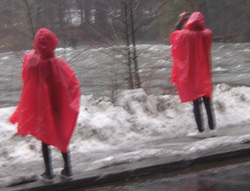
YOU CHOOSE
your overnight accommodation
The Outdoor Club will not make reservations for any overnight accommodations, individual students do that.
You have a number of choices of where you stay overnight (campground, heated-or-not wood floored canvas roofed/sided tent cabin, wood walled cabin or hotel room) and who you share a campsite with / have as a roommate (or you could come up just for the day Saturday – but people rarely do).
Trip members often make reservations for one of the tent cabins, cabins or hotel rooms (see photos below) well in advance, so they have more choices of where they will stay, and make a big note on their calendar of the deadline to cancel without paying a cancellation fee. (Seven days????) Then they look for roommates. (And for the 2026 trip some made tent cabin and hotel room reservations many months in advance).
We do not recommend staying overnight outside of Yosemite valley for this trip, even if it looks like you can get a really nice place to stay for a low price. Please talk to us about any you are considering before you make a reservation.
(From the park website: “Camping or sleeping in vehicles is permitted only in designated campsites. Sleeping in vehicles is not permitted anywhere else in Yosemite.”)
– – – the lowest cost overnight accommodation
is camping overnight
in either Camp Four, without a reservation and with no parking space at your campsite,
or
in Upper Pines Campground, (the only campground open in the winter with individual campsites with parking spaces). Each Upper Pines campsite ($72 for the two nights) holds six people and two vehicles.
Students got seven large campsites in a row in Upper Pines Campground (the only Yosemite valley campground open in the winter that you can park at your campsite) which they intend to share. Three of them are for the days of the trip: arrive Friday, Jan. 30 – depart Sunday Feb. 1, 2026. Four of them are for longer-than-the-trip-dates: arrive Thursday, Jan. 29, depart Monday, Feb. 3. People could choose to extend them as they want.
Here is the official Yosemite National Park map of three of the main valley campgrounds:
map of Upper Pines, Lower Pines and North Pines campgrounds
Usually only the first 2 campground loops of Upper Pines are open in the winter, not all 6 loops.
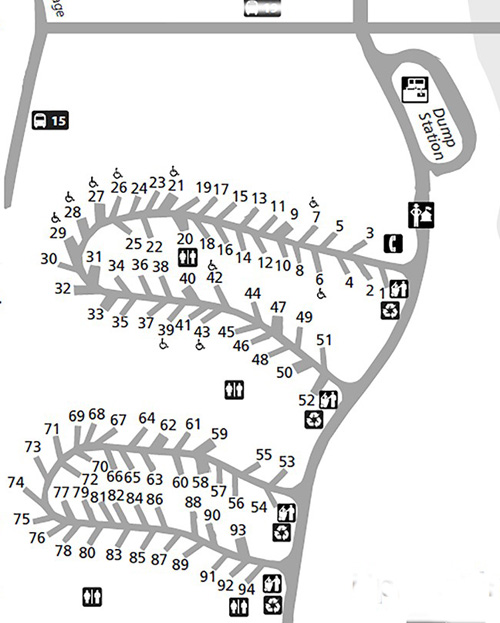
Sometimes the campsite parking spaces are not plowed of snow well enough for the maximum-allowed two vehicles to park, especially two SUVs. This is fine with one SUV with six people in it, but many people will want to drive in two-people-per-vehicle carpools or even by themselves.
They could possibly fit more people sleeping overnight (strictly enforced rules of maximum 6 people per campsite) and save money by paying for fewer campsites, by having some of those who want to drive in small carpools drop of their gear at the site and use free day-use parking for the extra vehicles. They could travel with three or four cars and six people but only buy one campsite. Maybe the car(s) that get to park at the site could pay a larger share of the campsite cost.
The nearest free parking lot is next to parking for Curry Village, a relatively short walk from the campground or a free daytime bus ride during years the free shuttle bus is in full operation.
One year, someone brought chocolate cake for breakfast:
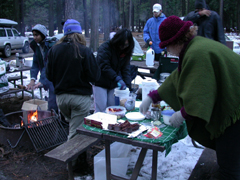
Each campsite has
a metal food storage box you must use for all food/toiletries ,
Even a thick layer of ice / snow slides off the top of a bear box fairly easily,
so it might be where you start to set up your campsite:
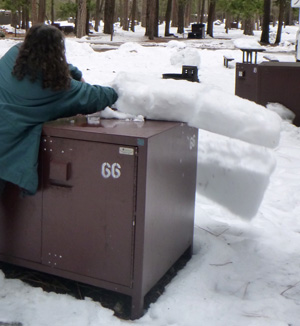
a picnic table which can not only have snow that needs clearing,
but a layer of ice beneath that needs more tools to remove it:
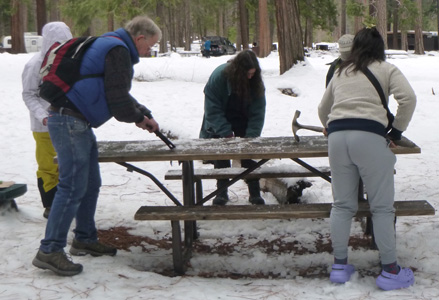
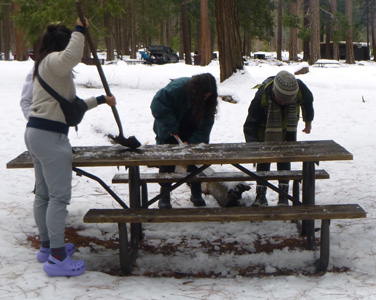
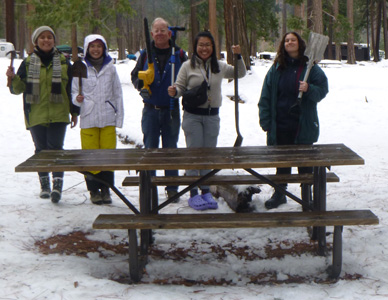
Each campsite also has a fire ring,
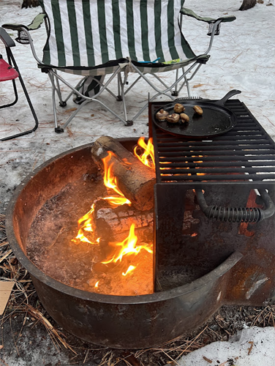
(Yup, you guessed it, no WiFi, in campgrounds, sometimes not even on your smart-enough-phone that is not getting reception in much of Yosemite valley.)
Each campsite loop has nearby restrooms, see the map. There is a shower house at Curry Village, a short walk (or one bus stop away on the free bus system) from the campground. And in the winter some years people not staying at Curry village can pay at the Curry Village front desk for a shower – (in the summer people not staying at Curry village can pay to swim in the pool and use the showers). Pictures of the shower house, and directions for finding it are at the YOU WILL WISH YOU HAD section of snow or rain camp must haves
Please note that no pets are allowed on our trips. There are no hook-up campsites for motor homes.
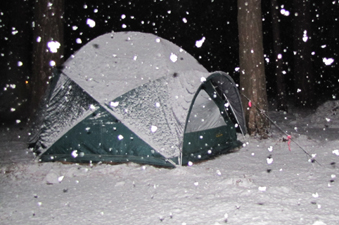
Photo above taken at 4:30 a.m. when it had been raining, but then it got colder
and rain turned into snowflakes the size of fifty cent pieces, captured by the camera flash.
One woman sleeping in the tent above on the 2011 trip had never been camping before.
Another on the trip had never seen snow fall.
At the end of the 2019 trip it started snowing heavily “SNOWZILLA“. . . and for 2 1/2 days all roads out of Yosemite Valley were closed and all campgrounds were closed due to risk from falling trees, but the students got out after brunch and just in time.
Here, an NPS photo of the result when a large tree fell on a campground restroom
(after they had closed that campground):
In other years we have occasionally had snow followed by rain and parts of the campground flood (parts we do not camp in, even if we do not expect any interesting weather):
– – – – – – – – – – – – – – – – – – – – – – – – – – – – – – – – – – – – – – – – – – – – – – – – – – – – – – – – – –
It really is warmer with 15 people in a six person tent, right?
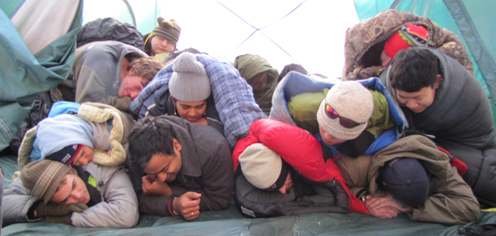
– – – – – – – – – – – – – – – – – – – – – – – – – – – – – – – – – – – – – – – – – – – – – – – – – – – – – – – – – –
– – – people without camping experience
and / or without cold weather camping gear
(or who just want to be more comfortable)
spend a bit more on a wood-floored, canvas roofed/sided tent cabin, (optionally heated, but bring a reeeealy good sleeping bag or even two) with various double bed and single bed combinations, electric lighting, restroom/showers nearby, lounge with free guest WiFi, walking distance from the campground (or a free daytime shuttle bus ride in years the shuttle is running the full route) but no phones/TV/fridge.
(Renting a tent cabin could be less expensive than renting proper winter camping gear / tent. )
AND it will not matter how late you leave town, as you will not need to pitch a tent out in the potential weather, you just move right into your tent cabin.
Lots of details to make your stay in a Curry Village (briefly named Half Dome Village) tent cabin more fun and comfortable are at:
Yosemite valley tent cabins tips and tricks
Below (photo courtesy of the NPS) are some of the canvas tent cabins and a bear that broke into one people left food in. Always use the bearboxes provided at each tent cabin and campsite. (First-timers info.)
Besides the canvas walled/roofed heated or not tent cabin,
Yosemite valley also has:
wood walled cabin without a bath in it, but with a bath house nearby
wood walled cabin with a bath
luxury or generic hotel rooms, suites with a bath, TV,
some with mini-refrigerators, some with coffee makers
There is no cooking allowed at any tent cabins, cabins or hotel rooms, but cabin/hotel dwellers can join people at the campground or go to various picnic areas, some with grills as well as picnic tables.
Details about 24 hour towing within the park for some vehicles, propane service, minor emergency repairs, how to use your Auto Association card to get their help, and more are at Yosemite garage, car repairs and towing. At that page you will find a list of locations of Electric Vehicle (EV) charging stations at the various hotels, near campgrounds, the Welcome Center and more.
For example, Curry Village has 20 level 2, the nearest ones to Upper Pines Campground, (west lot – next to the ice rink) .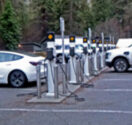
The drive from our college (or the vicinity) on either 120 or 140 is about 200 miles. This is something to consider when calculating your range and state of battery charge before you leave. If you are not heavy on the accelerator, your electric vehicle might make it to Yosemite on one full charge. Sometimes the Yosemite valley electric vehicle charging stations need repairs and will not be operable, perhaps even for days. Or a person who can not find a parking space where they want it parks their non-electric vehicle in a charging station space.
Please read In Advance of the Yosemite trip
TO LOOK AT THE cabins/hotel rooms/tent cabins,
and find details about how to check current prices and make a reservation.
Who’s going? / How Much?
We have had small and large groups (as many as 30 or 40 IF people sign up early and spread the word).
We always have people with previous experience on the trip
and often have people who have never been camping/never done a major hike and/or have never been in the snow.
Occasionally (2015, 2016, 2017, 2018, 2020) we have had a student who was an EMT on the trip.
You don’t have to be a club member to go on trips with us, just a De Anza student (or most faculty/staff), but members pay less for club events. Membership is $15 for 365 days. Reasons why you should become a member are at: Membership benefits
Rarely people decide to come up for just one day. If you decide to stay overnight, where you stay overnight will be up to you, but people usually decide to share campsites and/or tent cabins to save money.
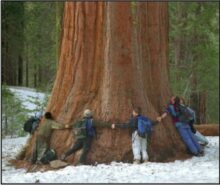
2026 WINTER YOSEMITE TRIP COST paid to the Outdoor Club will be
$30 Outdoor Club members and $35 other students
– OR if you sign up and fully pay by our last sign-up session at the end of fall quarter 2025,
$25 Outdoor Club members and $30 other students.
(Membership is $15 for 365 days and members pay a lower cost for each adventure.)
Trip participants are responsible for trip arrangements and costs, including, but not limited to: food you bring and potential meals eaten at restaurants, campsite, cabin or hotel cost, gas and other transportation costs, a little change for the laundromat to dry some damp clothes ( if the laundromat is open), ski/snowboard costs (there are rentals and lessons at the Yosemite ski resort), ice skate rentals and/or ice rink fee, postcards, t-shirts and other souvenirs, sleeping and eating gear and other personal gear. You can rent winter boots, jacket/pants at home before the trip.
You will need to pay the park vehicle entrance fee. You can’t pay for the fee with cash, just credit/debit. As of late 2025 the Yosemite park entrance fee is $35 per vehicle or $20 per motorcycle. An annual park pass will cost $70.
OR better yet, find someone to carpool with who already has a (National Parks and Federal Recreation Lands) Interagency annual pass. (If you also go on the club between-summer-and-fall-quarter Grand Teton National Park trip it would be very wise to get a year long national parks pass, $80 as of late 2025.)
OR find someone who is active duty US military personnel or their dependent “with proper identification (CAC Card or DD Form 1173)” and can get a free national parks pass https://store.usgs.gov/MilitaryPass
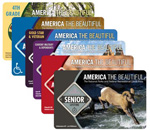 (These passes can’t be transferred/shared, the pass holder needs to be in your vehicle and show a valid government-issued photo ID.)
(These passes can’t be transferred/shared, the pass holder needs to be in your vehicle and show a valid government-issued photo ID.)
If you are riding in a carpool bring your share of gas, park entrance fee, etc. money.
Please also read details about what you must agree to in the trip agreement before you come to sign up: 2026 Yosemite winter trip agreement
And after you do, look at how to sign up (you sign up in person, on campus and that page tells you what to bring with you to sign up.) Note that people who have been on the Yosemite trip before can, by appointment, come to more sign-up sessions.
The club advisor does not have the time to answer questions about the trip that you could have found the answers to by reading ALL the Yosemite winter trip webpages linked to from this page thoroughly and carefully.
(And you will have an adventure that is much more fun if you really understand everything before you sign up.)
– – – – If you are fairly sure (or completely sure) you are going on the 2026 Yosemite trip, please email the club advisor at donahuemary@fhda.edu to get on the trip email list. Include how sure you are that you are going, how you will get to Yosemite National park, and where you will stay overnight, when you intend to sign up. – – – –
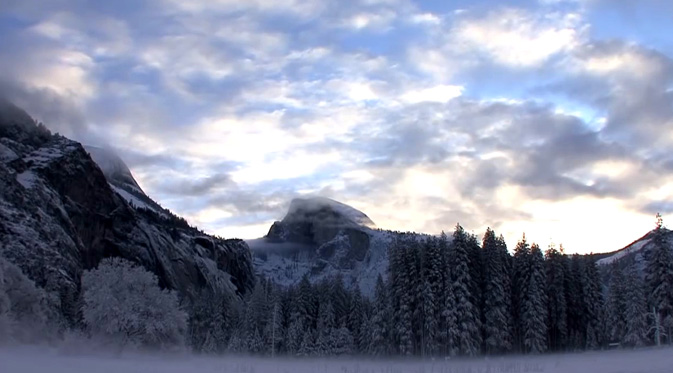
How to do it info:
For a list of required equipment
(and another list of the things you might really wish you had)
as well as menu advice, and a discussion of what to look for in long-johns, fabrics and rain gear, go to: Snow or rain camp must-haves To go on our trip you must read the must haves list and follow it.
On a budget? We do shopping surveys and list the cheapest places to buy the needed gear, often at half the price of higher priced camping gear stores, as well as rentals of snow boots/jackets/pants and tents/really good sleeping bags/insulated sleeping pads.
How many people can you fit in an eight person tent?
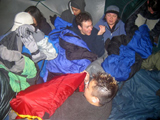
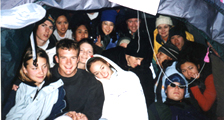
![]()
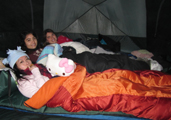
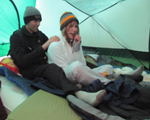
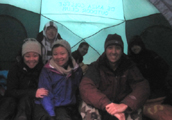
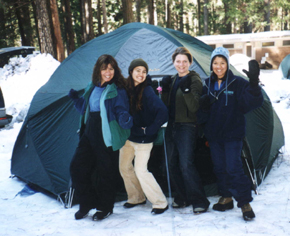
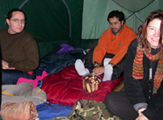
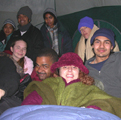
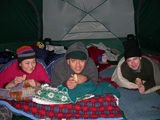
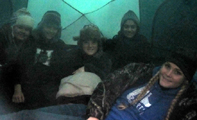
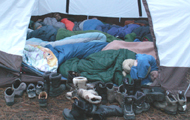
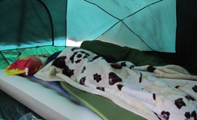
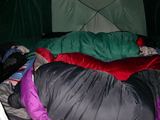

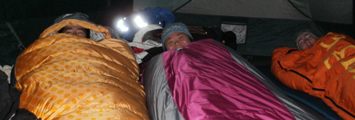
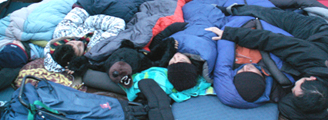
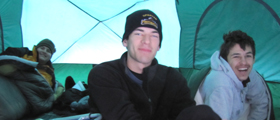
_______________________________________________________
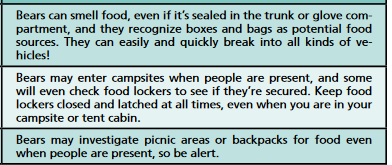
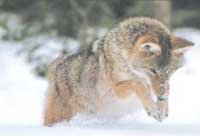
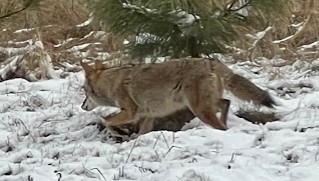
There WILL BE coyotes and raccoons, possibly bears that woke up from hibernation, or who choose to not hibernate over the winter
in the campground and cabin/hotel areas. We’ve seen coyotes every time of the day and night and heard them singing overnight. People on previous trips have made lots of mistakes about food storage and dealing with animals.
For info on the logistics of food storage, where in the campsite to pitch your tent, dealing with iced car door locks, staying warm and comfy overnight, how bears reeeeeaaaally do break into cars and much more, go to: First-timer’s instructions .
_______________________________________________________
! ! ! ! Tent walls are thin. You can wake up everybody in the vicinity ! ! ! ! when you want to get into your car and you use the keyless (remote) door opener and the car makes the usual loud beep. People don’t think to just use the key to open the door or don’t know that if you look in the owner’s manual you can find a way to disable the beep. On De Anza Outdoor Club trips you are required to either disable the beep or not use the remote (remove it from your key chain during the trip) or park at day use instead of at the campground.
Some vehicles have a beep activated whenever you open the trunk, that can’t be easily disabled. Every time the trunk is opened it beeps and it will wake up people on our trip and in neighboring campsites. If your vehicle has this function, either look in the owner’s manual for info on how to disable the beep or take it to the dealer and get it done, or do not park it at our campground, or find another vehicle.
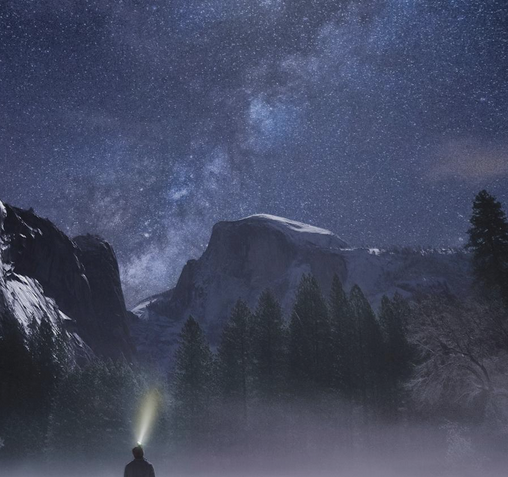
There will be a full moon on Sunday, Feb. 1, 2026,
and the almost full moon will be out all night and will set at 6:28 a.m. on Jan 31, and at 7:42 a.m. on Feb 2, near to sunrise.
With clear weather we might see the Milky Way even with the moonlight.
Sunrise Jan. 30 will be 7:07 a.m., sunset 5:21 p.m. (and within a minute or so each day around then).
Civil twilight (when the sky starts getting light before sunrise) will start at 6:38 a.m. +/-
You will likely be cooking dinner in the dark and might finish a hike in the dark.

What will the weather be like? We could have 1 1/2 foot deep snow in Yosemite Valley or very-early-spring type weather with only a little snow on the ground leftover from a storm weeks before.
For some people, this trip is the first time they have seen snow fall,
including one woman in the photo below with giant snowflakes falling:

It might snow or rain while we are there, or the sky could be clear of clouds and at night we can often see the stars of the Milky Way.
It might rain during the day and when it gets colder at night the rain could turn into snow falling.
It could rain at the lower elevation of Yosemite Valley (4,000 feet) and at the same time, it could be snowing at a higher elevation going up the trail to the top of Yosemite Falls (6,500 feet) and at the ski resort (7,200 feet). (For a comparison, De Anza College is at only 300 feet elevation.)
Often when there is a National Weather Service winter storm warning for the California mountains it will list many places that will have snow and say: “Yosemite National Park outside of the valley,” because Yosemite valley is at lower elevation and can expect less snow than most other parts of the mountains. Highways I 80 and 50 (Tahoe-ish) are much, much more likely to close than the ones into Yosemite Valley. (120 into Yosemite will have more snow than 140.) 140 is the usual – and recommended – route most people on our trips take. (Driving directions for 140 and 120 are at: Snow Camp carpools and driving directions.)
We could have to deal with the Mono winds. You might encounter hazards on trails. (The ski resort sometimes closes in advance of when mega-snow-storm is expected.) To go on this trip you must read: Snow camp weather, hike safety and first aid considerations
If we have clear weather, with hardly any moon out, or nighttime after the moon sets/before it rises we could have great stargazing.
(People on the Outdoor Club August adventure to Grand Teton National Park have had much more stargazing success, including seeing meteor showers. Details about the yearly trip start here.)
_______________________________________________________
Details are below
of what there is to do on this trip.
On Saturday, some people on this trip will take the free bus to the ski resort to snowboard, ski or snowshoe. (In 2014 the weather brought the skiers fresh powder that morning.) They offer (fee) snowboard or ski (downhill or cross-country) lessons/rentals at the resort and a (free) Ranger-Naturalist guided snowshoe walk (for example, early 2023 scheduled for 9:30 – 11:30 a.m. Saturdays, Sundays and Wednesdays, then later switched to 10 a.m. – noon. Check the Yosemite Guide for details). (The ski resort sometimes closes in advance of when a big storm is expected.)
For our 2026 trip the Park Service reported
“Badger Pass Will Open for Nordic Operations on Friday 1/9
Badger Pass will officially open for the season with Nordic (cross-country skiing and snowshoeing) opening this Friday 1/9, and Alpine (downhill skiing and snowboarding) and the grill will open the following Friday, 1/16.”
Most years, depending on snow pack on the trails, usually more people will do a major hike, like the one to the top of or the base of upper Yosemite Falls, one of the tallest waterfalls in the world. (There’s a free bus to the trailhead, but people not staying at the Lodge (where they can walk to the trailhead) might want to carpool and plan to park at the free Lodge day use parking lot so it will not matter how late they get back from the hike.)
Others will do a few short hikes / walks or a Ranger nature or history walk, photo walk you design for yourself or go ice skating. (Free bus to those places, too.) Some will try to fit in working on a term paper on a laptop, but most of that homework is usually done in the evening.
Again, the REQUIRED 7 a.m. Saturday meeting may be the time many people finally decide what they are doing on Saturday.
– – – – – – – – – – – – – – – – – – – – – – – – – – – – – – – – – – – – – – – – – – – – – – – – – – – – – – – – – –
Yosemite Falls Hike
Below are three photos (from different years of trips), of upper Yosemite Falls with the winter snow cone at its base. This potential Saturday hike, if the trail is clear enough, can get us quite close for photos.

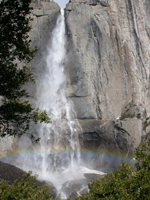
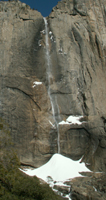
The section of the upper Yosemite Falls trail near the top, as shown below, has a lot of snow some years, which is part of the reason we expect people to hike in groups of four or more if they go above the valley floor. That way if someone gets into trouble, there is someone to stay with them while two others go back for help. The Park Service has reported about other people who went off trail on the Yosemite falls hike, went to an unsafe area and died. Did you read Snow camp weather, hike safety and first aid considerations ?
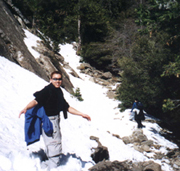
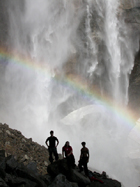
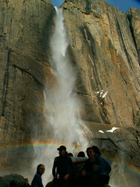
do not realize there is a trail with a railing out across the cliff face at the top.
(Check out the people in almost the center of the photo below):
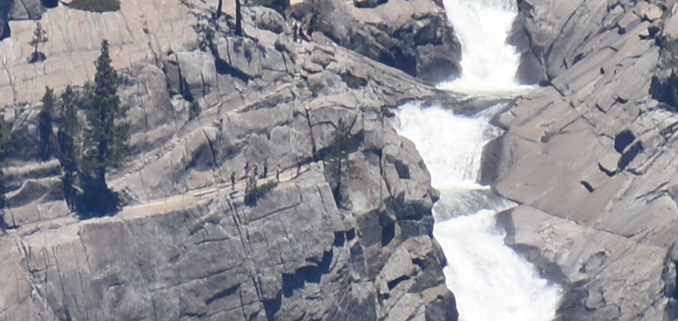
More pictures, maps and photo maps of this hike are at Upper Yosemite Fall hike .
The world’s 10 tallest waterfalls
Angel Falls, Venezuela 3,212 ft.
Tugela Falls, South Africa 2,800 ft.
Utigordsfossen, Norway 2626 ft.
Mongelfossen, Norway 2540 ft.
Yosemite Falls, Yosemite 2425 ft.
Espelandfoss, Norway 2307 ft.
Sentinel Fall, Yosemite 2,000 ft.
Cuquenan Falls, Venezuela 2000 ft.
Sutherland Falls, New Zealand 1,904 ft.
Kjellfossen, Norway 1,841 ft.
– – – – – – – – – – – – – – – – – – – – – – – – – – – – – – – – – – – – – – – – – – – – – – – – – – – – – – – – – –
Ski, Snowboard
There are nearly 350 miles of cross-country ski-able trails and roads in Yosemite including 25 miles of machine groomed track and 90 miles of marked trails (no fee) that begin at the Yosemite Ski and Snow area (Badger Pass). Very near Badger Pass there are some relatively short trails to scenic points and some nearly level machine groomed track for beginners. The road to Glacier Point is groomed for cross country skiing in the winter.
Composting toilets are usually open for use at Summit Meadow, #21 Bridalveil Creek Ski Trail, Sentinel Dome Parking, and Glacier Point.
The mileages from Yosemite Ski and Snow area (Badger Pass) are:
Summit Meadow, 1 mi. (There is almost always an operational outhouse there.)
Bridalveil Campground, 2.8 mi.
Bridalveil Creek, 3.3 mi.
Ostrander Trailhead, 4.1-4.5 mi.
Clark Range View, 5.7 mi.
Sentinel Dome, 9.2 mi.
Glacier Point, 10.5 mi.
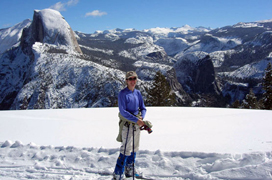 Only very experienced skiers should attempt the route to Glacier Point.
Only very experienced skiers should attempt the route to Glacier Point.
Signed winter trails (no fee) are also available at Crane Flat, in the backcountry and among the Giant Sequoias of the Mariposa Grove.
Maps/ distances of cross country ski trails at Badger Pass, the Glacier Point Road, Crane Flat and the Mariposa Grove (that you can click on to make a larger printable size) are at:
https://www.nps.gov/yose/planyourvisit/wintersports.htm
If snow is late in coming to the park, the Nordic Center sometimes opens for cross-country and snowshoe rentals before the Yosemite Ski & Snowboard Area (Badger Pass) opens for downhill, snowboarding and tubing.
![]()
If there is not enough snow for the ski resort to open at all, people can go play in the snow at Crane Flat, which is the best area to use your own sled because sliding devices are not allowed at the Badger Ski resort.
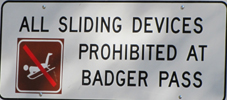
(We recommend using a real sled, not a piece of cardboard.)
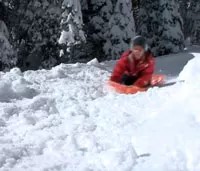
Crane Flat is located at the intersection of the Big Oak Flat Road and the Tioga Road, 16 miles (30 minutes) from Yosemite Valley. (You will need chains on your vehicle, or maybe just four-wheel-drive and snow tires, to go there in the winter.) The Crane Flat play area is located just south of the Crane Flat gas station, near the Crane Flat Campground.
This map shows to snow play area and part of the cross-country ski trails.
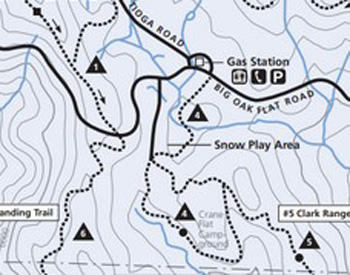
You can download a full sized version of the map above at: https://www.nps.gov/yose/planyourvisit/wintersports.htm
![]()
Some days there has been too much snow and the resort closes for a few days
(for example mid-January 2017, late December 2021 and late-January 2024).
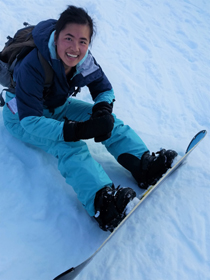 Links to Yosemite Ski and Snow area (Badger Pass) downhill and cross-country skiing, snowboarding and tubing start at:
Links to Yosemite Ski and Snow area (Badger Pass) downhill and cross-country skiing, snowboarding and tubing start at:
https://www.travelyosemite.com/winter/badger-pass-ski-area/downhill-skiing-snowboarding
and
https://www.travelyosemite.com/winter/badger-pass-ski-area/cross-country-skiing
and
https://www.travelyosemite.com/winter/badger-pass-ski-area/snow-tubing
The two terrain parks have boxes, rails, rollers and big-air jumps.
In lat 2025 (and many years previously) the Travel Yosemite webpage said:
“We salute our heroes! Special discount for military, emergency medical services (EMS), police and firefighters to say thank you for your service.
Badger Pass Ski Area is proud to extend the following offers to military and first responders and their families. Present your ID or documentation at the Badger Pass Ski Area Activities Desk to receive this offer.
Offer Details
Military & first responder deal – must show valid active ID. Benefits include lifts/rentals only.
Offer is valid for active military, veterans and retirees.”
This offer was online at: https://www.travelyosemite.com/winter/badger-pass-ski-area/season-passes-discounts/
and click on Military and First Responders.
(There have previously been Blackout Dates, but usually not during our trip.)
– – – – – – – – – – – – – – – – – – – – – – – – – – – – – – – – – – –
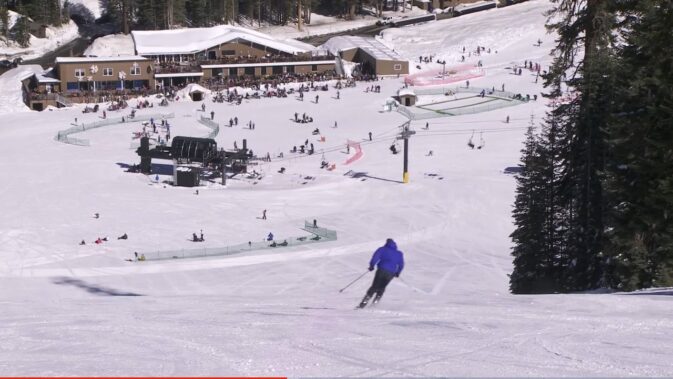
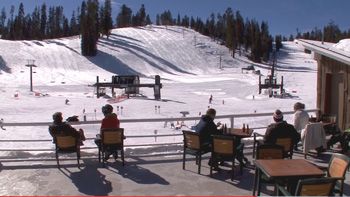
lift ticket ( half day / all day) and equipment rentals, lessons prices are at:
https://www.travelyosemite.com/winter/badger-pass-ski-area/downhill-skiing-snowboarding/
cross-country ski info:
https://www.travelyosemite.com/winter/badger-pass-ski-area/cross-country-skiing/
On the 2023 trip some people rode the free bus to the ski resort, rented cross-country ski gear and had a do-it-yourselves lesson on the free-for-everybody-to-use groomed X-country ski trail:
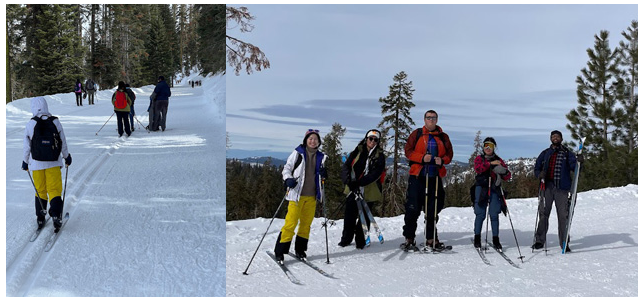
A map you can enlarge of cross county ski trails / showshoe paths / skate ski lanes at Badger Pass (Yosemite Ski and Snowboard area) is at:
https://www.nps.gov/yose/planyourvisit/upload/GP_v5-23-05-30-w-legend-3000×1821.jpg
The route up closed-to-vehicles-in-the-winter Glacier Point Road, with the the free-for-everybody-to-use groomed X-country ski trail, (the Nordic ski Route shown in the left hand side picture above) from Badger Pass (Yosemite Ski and Snowboard area) to Summit Meadow (with a usually operable outhouse) is 1 mile (1.6 km). It has an “easiest” rating on the Ski Trail Difficulty scale, with the note “trail ratings are based upon ideal snow conditions and may change radically due to changes in weather and snow conditions.”
And the park says: “Nordic ski routes are intended for ski or snowshoe travel only. Snowshoers, please stay single file along the edge of the road or trail to minimize your impact.
Never walk or hike on the ski trails as post hole damage (however shallow) is long lasting and presents real hazards to yourself and all other winter recreators. Only bears still walking around in the winter are excused from this expectation.”
At https://www.nps.gov/yose/planyourvisit/upload/GP_v5-23-05-30-w-legend-3000×1821.jpg you will also find this on the
etiquette of using groomed cross-country ski tracks (the two sets of parallel lines close together):
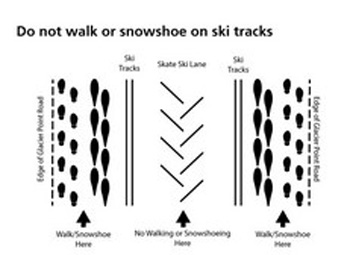
– – – – – – – – – – – – – – – – – – – – – – – – – – – – – – – – – – –
Badger Pass webcam.
Call 1 (209) 372-1000 for ski conditions.
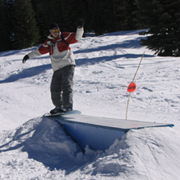
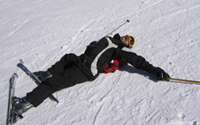
If you want to rent downhill or snowboard gear you might want to rent it at the Yosemite resort. If you rent gear at home before the trip it could be a waste of money if a storm closes the road to the resort, shuts down power to the ski lifts, closes the resort completely
or you decide that the all day hike that day would be more fun.
– – – – – – – – – – – – – – – – – – – – – – – – – – – – – – – – – – – – – – – – – – – – – – – – – – – – – – – – – –
Snowshoe walk with a Ranger
Early January 2026 it started snowing, and the Yosemite Guide newspaper said:
“Join a park ranger or volunteer for a FREE
snowshoe walk, and learn more about winter
in Yosemite! Snowshoes provided. Dress
warmly. Check the Yosemite Valley Welcome
Center for dates and times.”
Here are notes from previous years:
Conditions permitting, the rangers offer a free daily or a few times a week, snowshoe walk (moderate to strenuous) with a Ranger naturalist
which meets at the Yosemite Ski area (Badger Pass) Ranger office A-frame:
In 2022 reservations for the snowshoe walk were required. But as of the January 2023 Yosemite Guide https://www.nps.gov/yose/planyourvisit/guide.htm said reservations are no longer required. (You guessed it, this could change with little notice.)
for example, beginning January 11, 2023
Snowshoe Walk: Explore the Forest in winter (conditions permitting)
Space is limited, based on snowshoe availability.
Meet at Badger Pass Ranger Station for a naturalist led tour of winter landscape. Snowshoes provided. Bring warm clothing.
Expect a moderately-strenuous experience. Not recommended for children under 10 years old
Adult sized snowshoes provided, no experience necessary. (Early 2023 scheduled for 9:30 – 11:30 a.m. Saturdays, Sundays and Wednesdays, then switched to 10 a.m. – noon. Check the Yosemite Guide for details.)
The walk is 2 miles with roughly 500 feet elevation gain.
Note that if any Ranger-led snowshoe walk is cancelled
(example: snow storm left too much snow on the roads)
there will likely be no way for you to be notified.
If a mask is required – the mask will keep your nose warmer.
(Please don’t confuse this with the snowshoe walks/hikes sometimes offered by the Yosemite concessionaire, at a higher price, with signups and payment in advance required.)
The ranger will describe the subniveal space between the surface of the ground and the snow, and the creatures (mice, voles and shrews) that live and travel there all winter.
(Read info about how animals get through the winter at: https://yosemite.org/winter-wonder-in-mariposa-grove/, which has raccoon and deer prints in the snow.)
(Photos below by Monica Colmenares and Richard Neimrec.)
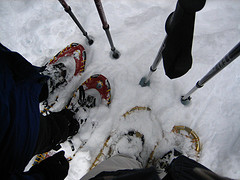
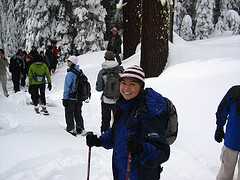
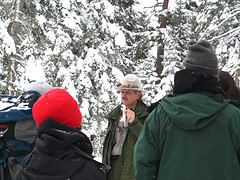
Sometimes the walk ends with an optional snowshoe run:
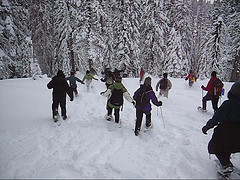
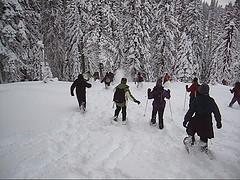
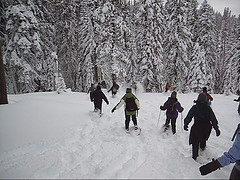
You can sometimes find details in the Yosemite Guide newspaper that you can download before the trip or get a copy of at the entrance station or most hotel front desks.
https://www.nps.gov/yose/planyourvisit/guide.htm
– – – – – – – – – – – – – – – – – – – – – – – – – – – – – – – – – – – – – – – – – – – – – – – – – – – – – – – – – –
Free bus to skiing, snowboarding, snowshoeing
Road and weather conditions permitting, the free bus to the ski resort for the snowshoeing, skiing and snowboarding leaves Curry Village (two blocks from the campground) at
(most years – note that some years, or parts of some winters, there is only one pickup time, not two)
8:05 a.m. and 10:35 a.m. and makes stops at various hotels: Yosemite Village 8:10 and 10:40, (not every year – Ahwahnee 8:15 and 10:45), Yosemite Lodge 8:30 and 11) arrives at Badger Pass approx. 9:30 and 12:05 and returns from the ski resort at 2 and 4:30 p.m. arriving at Curry Village (again about two blocks from the campground) approx. at 3 and 5:30 p.m. Confirm the return times when you get to the ski resort.
Allow at least one hour from the last pickup stop to get to Badger Pass; one hour for the return to Curry Village.
Look for the Shuttle link at:
https://www.travelyosemite.com/winter/badger-pass-ski-area/ or
https://assets.milestoneinternet.com/aramark-parent/yosemite-national-park/pdf/badger-pass-shuttle-20240119.pdf
Please note that the schedule can change during the season (weekends only versus everyday / locations of stops / time of pickups),
and I might not know, so you should verify when you get there.
In 2024 they added a note “Only one shuttle bus will be available each run with a maximum capacity for 45 people.”
Here, a line of (15!) people one morning in February 2023 wanting to get on the bus at the stop at Yosemite Lodge who were turned away because the bus was full. (The Outdoor Club people that year were early in line to get on the bus and none of us was left behind.) Notice, at the lower left, the doors open to the big storage section for your skis, snowboard and other bulky items.
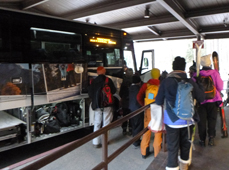
![]()
In Yosemite Valley
If the Yosemite Valley Visitor Center, Yosemite Theater, Yosemite Museum and /or Exploration Center need to be closed; an outdoor visitor contact station staffed by park rangers is available at the Exploration Center or Visitor Center (or sometimes in front of it – look for signage).
OR you can shop online (the Yosemite Conservancy) and “your purchases help fund important work in Yosemite, to repair trails, restore habitat, protect wildlife and much more”. https://shop.yosemite.org/
The park newspaper which you will be offered a copy of as you pay at an entrance station to enter the park, or you can read, download or print in advance, has all the current hours of operation, activities and is updated as needed.
http://www.nps.gov/yose/planyourvisit/guide.htm
A free shuttle bus (a different one than the ski/snowshoe walk bus) goes to stops at stores, restaurants, visitor center, trailheads in the valley in the winter (early 2025) from 7 a.m. to 10 p.m. (but check the timetable at each stop) at 20 to maybe 30 minute intervals. The route, stops and how to find the stores, restaurants, etc. are at: Yosemite Valley free shuttle bus
From shuttle bus stop number six, you can take a short walk along a loop to the base of Yosemite Falls, with this view from the far left portion of the loop
You can set up a photo of getting a drink from the lower fall:
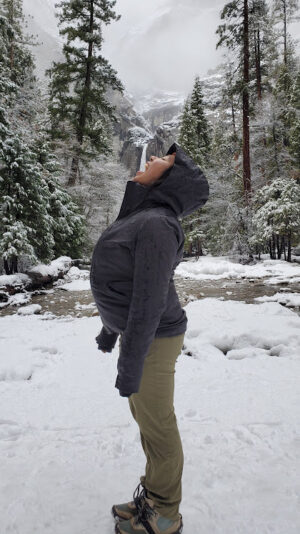
or catching the fall in your hands:
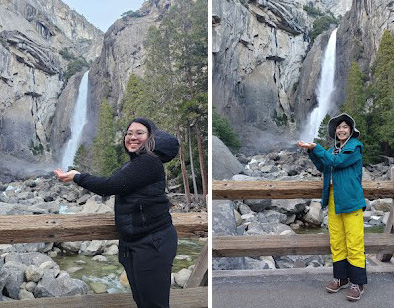 Read more about this walk, and find a map at:
Read more about this walk, and find a map at:
How to find the location of John Muir’s cabin (hang nest) in Yosemite Valley
INDIAN CULTURAL VILLAGE
Walk through the reconstructed Indian Village of Ahwahnee and learn about the structures the Ahwahneechee lived in and the plants they used for survival. View the interactive displays and see the ceremonial roundhouse, bark houses, and sweathouse members of the local tribes still actively use.
Located behind the Yosemite Museum in Yosemite Village.
At stop 5 the Exploration Center and bookstore are open 9 a.m. to 5 p.m. The Spirit of Yosemite, a great visitor orientation film with some swooping aerial views along with history and scenes from all seasons and all parts of the park plays in the theater behind the main building. Free.
The Yosemite Museum, next to the main valley visitor center is usually open (early 2025) 10 a.m. to 4 p.m., may close for lunch.
The Ansel Adams gallery has photo walks with a professional photographer, weather permitting, at various times/ days of the week. One is free, but as of 2022, 2023, 2024 most lessons are for a fee. Sign up in advance at the gallery. Check with them for the current details. 1 209 372-4413.
see also: Yosemite winter photos
There are more than 12 miles of surfaced bike paths on the valley floor and the weather is sometimes good enough to ride or rollerblade. (2016 had most of the bike trails safe to ride on, some icy. 2024 had lots of snow everywhere) A map of bike paths is at: http://www.nps.gov/yose/planyourvisit/biking.htm
When we get early spring weather instead of snowy winter, the bike rental stands are sometimes open. Look for the rental info (and a map) at Yosemite Lodge at free shuttle bus stop number 7.
Listen to the snow fall, listen to coyotes sing, make snow angels…

The Yosemite Guide newspaper has lots of safety info, a calendar of park activities including Ranger walks, and hours of operation for visitor centers and museums, tours, stores (early 2025 various stores open from 8 a.m. to 8 p.m. or even 10 p.m.), food service (winter 2025 from 6:30 a.m. to 5 p.m., 6 p.m. 7:30 p.m. or 8 or at one place even 9 p.m.), showers (24 hours at Curry Village, closed for cleaning sometimes), post office, auto service, gas stations (no gas stations in Yosemite valley, fill up before you come into the park, or drive 30 minutes to Crane Flat and hope the self-service pumps are in order) and more.
What if it storms so much they close the road to the ski resort?
We won’t be able to ski, go on the ranger snowshoe walk
or take one of the long hikes.
Will there be anything to do except hide in the car,
play cards at the laundromat
or go online at wherever they have it
(usually for a fee and not always operable)?
The answers are at:
Things to do during a Yosemite snow storm besides hiding in your tent
– – – – – – – – – – – – – – – – – – – – – – – – – – – – – – – – – – – – – – – – – – – – – – – – – – – – – – – – – –
Evenings are spent
at a restaurant
and / or
Yosemite Naturalists present various Yosemite topics at the Yosemite Valley Lodge Cliff Room some evenings of the week. The Cliff Room is located next to the Mountain Room Lounge.
and/or
Ice skating
https://www.travelyosemite.com/winter/curry-village-ice-skating-rink
Pay to ice skate / rent skates at the kiosk in front of the Curry Village main office.
(1 (209) 372-8341 ) Usually more (and earlier) sessions on Saturday, Sunday and holidays than on weekdays. Some winters only open on Friday/ Saturday. Look for the schedule in the Yosemite newspaper. (Free helmet upon request.) Could close during and after rain or due to mechanical issues with the Zamboni.
We usually have trip members who know how to ice skate and can teach others in the group:
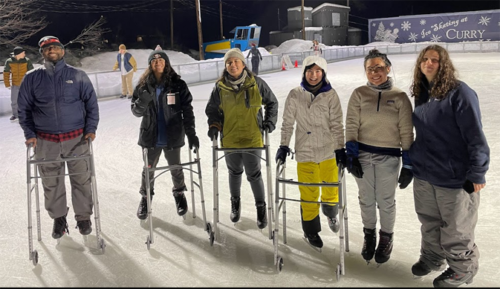
photo below by who?
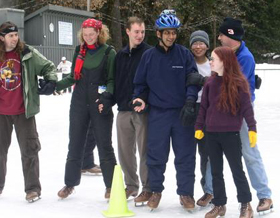

When none of the group gets a campsite, or all of the people camping are away from their campsite in the evening, you can still roast marshmallows at the huge fire with lots of seating next to the ice rink:
If it is not cloudy we can see a lot more stars than at home.
Evenings in the campground are spent playing guitar and gossiping around the campfire, working on a term paper, playing charades and board games, (if there is enough snow, trying to finish an igloo that really only became a snow wall).
(first four photos below by Colin Underwood.)
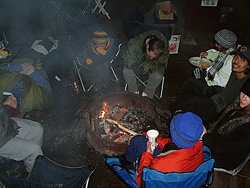
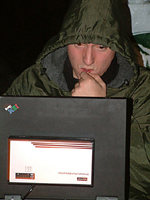
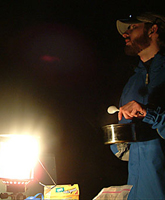

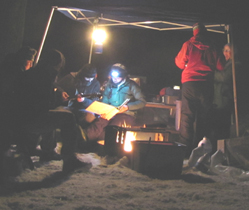
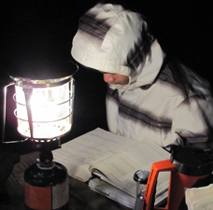
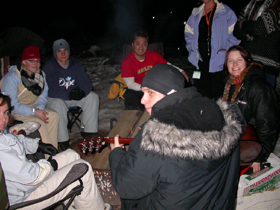
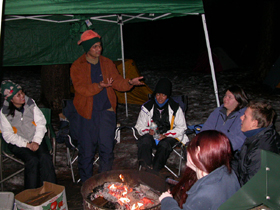
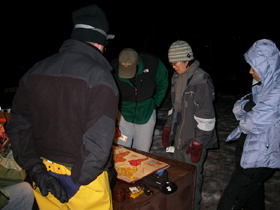
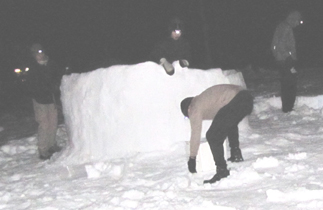
![]()
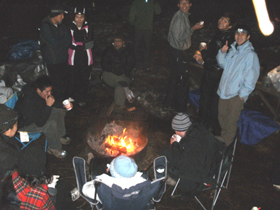
This girl was caught studying in the restroom at 5 a.m. on one of our Yosemite winter trips. Why in the restroom? Because it’s heated in the winter and you can save on flashlight batteries. At 5 a.m. it’s quiet except for the coyotes she heard howling in the distance. Lots of people study on our trips, bringing homework, projects and even laptops. Some study in cars on the way to and from the trip. This might not be as effective as studying at home, but you’ve got to get away and have fun sometime!
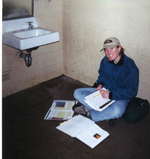
– – – – – – – – – – – – – – – – – – – – – – – – – – – – – – – – – – – – – – – – – – – – – – – – – – – – – – – – – –
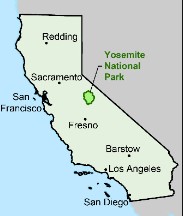
Getting to Yosemite:
The college does not provide transportation.
The Outdoor Club can’t arrange rides, (students arrange carpools among themselves).
– – – – – – – – – – – – – – – – – – – – – – – – – – – – – – – – – – – – – – – – – –
Or instead of driving (and having to put on chains) you can use public transportation, an Amtrak train most of the way there, then transfer to a YARTS (Yosemite Area Rapid Transit System) bus YARTS has said: “Enjoy breathtaking views on your journey to Yosemite National Park without worrying about driving. YARTS over-the-road coaches offer a comfortable ride with plenty of storage space, onboard lavatories, ADA accessible seating, and large windows, perfect for enjoying the scenery.”
and yes, the YARTS bus fits in between the ginormous rocks at the Highway 140 (Arch Rock) entrance station:
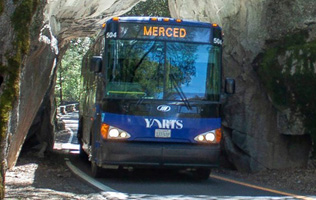
– – – – – – – – – – – – – – – – – – – – – – – – – – – – – – – – – – – – – – – – – –
People going on our Yosemite road trip have various routes to chose from to get to Yosemite.
one set of directions for people going to Yosemite valley from San Jose, Cupertino, Campbell, Palo Alto, Mountain View, Los Gatos, Saratoga, Los Altos, Los Altos Hills, Monte Sereno, Santa Clara, Milpitas, Gilroy, Morgan Hill, etc. including route 140, the route most people prefer and a few notes about 99/145/41.
A second set of directions covers the 580/205/120 route for people driving to Yosemite from Fremont, Oakland, Hayward, Walnut Creek, Pleasanton, Union City, Livermore, Newark, San Ramon, Castro Valley, etc.)
There are pictures of what you will see along the way. Please take look at (and we advise you print a copy of) snow camp carpools and driving directions, so you can find the campground and hotels and miss out on the $280 fine you might not be aware of.
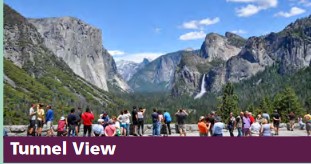
The driving directions webpage has a suggested side tour/stop at Tunnel View on your way into Yosemite Valley that can be quite worthwhile, especially if you are coming into the park in daylight.
and also see:
Parking and traffic jams in Yosemite valley tips and tricks
Prepare for winter driving has a link to bad weather driving tips, tips for using tire chains, tricks for dealing with frozen car locks, how to prepare your vehicle for winter driving, how to de-fog the windows, a winter survival kit for your car and what to do if you get stranded. Don’t have tire cables or chains? Yosemite requires them in the winter. Try: Snow chain rentals
People on a budget often put up with not-essential-for-safe-driving problems with their cars.
But deferred repairs and maintenance can spoil a road trip.
The road trip vehicle prep and recommended service webpage includes things people can do without paying a mechanic.
Road trip advice and etiquette from club road trip experts, could make the drive more fun.
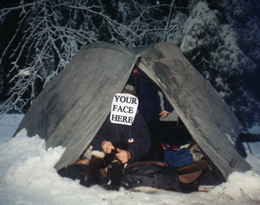
How can I sign up for this trip?
The Outdoor Club has a good reputation with Risk Management and they let us do adventurous trips like this one as a result. The club wants to keep that reputation and wants the trip to be safe and fun. You will need to read most of the links from this page about safety, Yosemite rules and take a written test before you can sign up for the trip. The first people to sign up in 2022 & 2023 & 2024 & 2025 got perfect or almost perfect scores on the test. Sample test questions and a few of the answers are at: Snow camp pre-test sample questions
We got tired of people who brought useless rain gear on previous trips.
We had to dress them in plastic leaf bags:

Go to: Snow or rain camp must-haves for details and ideas for people on a budget.
People who intend to camp instead of getting a hotel room / tent cabin in Yosemite really should bring the tent they want to use and pitch it for club experts to look at.
and you will need to pay for the trip when you sign up. Details about how to pay are here.
You must sign up in person.
How/when/where to find us to sign up is at:
how to sign up for the 2026 Yosemite winter weekend trip
For the answer to the question:
How do I convince my parent(s)/guardian that I can go on this trip? or How do I convince them to pay for some gear for the trip?
Go to: Snow camp FAQs

More things could fit in the bear-proof storage lockers if everyone brought smaller containers of food, etc.
NO!→ 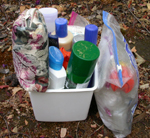 ← Yes!!
← Yes!!
and if everyone brought their gear in small, deep plastic trash cans or other plastic boxes close to, but no more than, 17 inches tall. A typical bedroom waste receptacle could be 9″ by 12″ by 17″ deep and hold quite a few cans of food, cooking items and toiletry bags. If you’ve never shared bear boxes with a big group, read
Using a campsite food storage locker
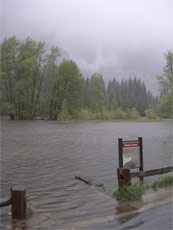
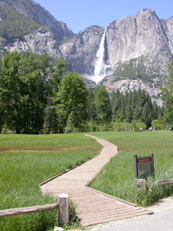
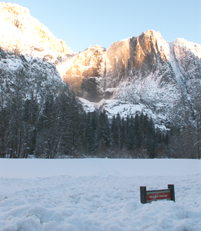
see: Yosemite Falls view in February snow and other seasons
Yosemite webcams brought to you by the Yosemite Conservancy, a non-profit park support group:
https://yosemite.org/webcams/yosemite-falls/
https://yosemite.org/webcams/half-dome/
There’s easy camping info at: Have more fun camping
http://www.gutenberg.org/ebooks/7091
Favorite chapters for winter trip reading include:
Winter Storms and Spring Floods
Snow-storms
Snow Banners

How much water will there be in the Yosemite waterfalls?
Yosemite nature podcasts: https://www.nps.gov/yose/learn/photosmultimedia/ynn1.htm
episode #5 is snow, #2 is Yosemite Falls
#19 is night skies
#28 is ski Yosemite
#9 is frazil ice
photos below by Quang-Tuan Luong/terragalleria.com, all rights reserved.
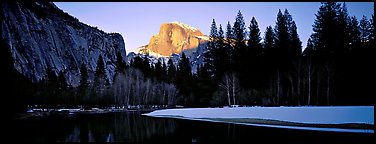
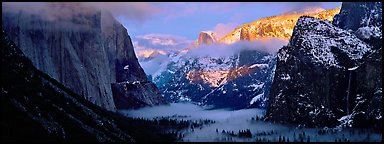
Answers to most questions about how the De Anza Outdoor club works are at: Outdoor Club Basic Info
The main rules common to most of our trips, including who is eligible to go, are at: Outdoor Club trip rules.
______________________________
(Links to all Outdoor Club Coming Attractions are here.)
______________________________
two photos below by Quang-Tuan Luong/terragalleria.com, all rights reserved.
Valley View (seen on the way out of Yosemite Valley) panorama spring and winter:
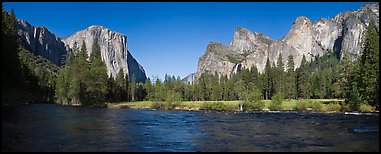
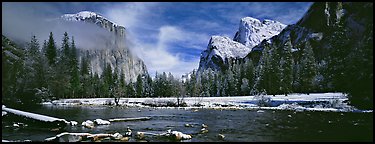
at the end of previous winter Yosemite trips
were mostly strangers when the trip started.
![]()
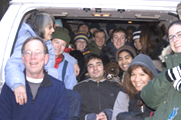
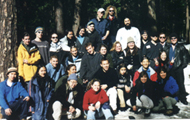
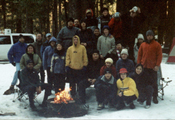
![]()
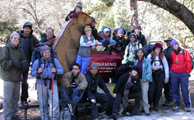
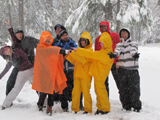
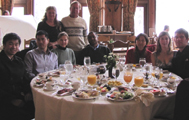
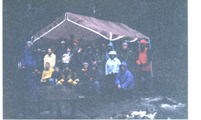
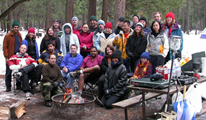
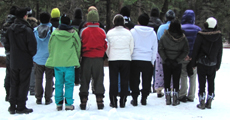
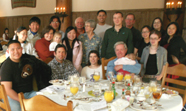
![]()
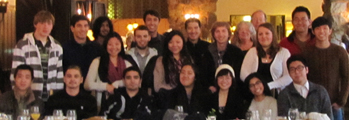
2005 February 2005 Yosemite camping
2006 De Anza College Outdoor Club Yosemite winter trip 2006
2008 Oops, no group photo: De Anza Outdoor Club Yosemite snow camp 2008
2009 De Anza winter Yosemite trip 2009
2010 De Anza Outdoor Club Yosemite winter trip 2010
2011: De Anza College Outdoor Club winter Yosemite trip 2011
2014: 2014 Yosemite winter trip
2015: Yosemite winter camping trip 2015
2016: Yosemite winter camping trip 2016
2017 photos, with the hot tub in the snow at the campsite, are at snow camp 2017
2018: Yosemite winter trip 2018
2019: Yosemite winter trip 2019
2020: Yosemite winter trip 2020
2022: Yosemite winter trip 2022
2023 photos are here and there at this webpage (including logistics of clearing snow off a picnic table)
2024 Yosemite winter trip 2024
During the 2025 winter quarter Yosemite trip, people stayed in every sort of overnight accommodation, camping or Curry Village cabin, or Yosemite Lodge Hotel room
. . . and . . .
the club president got the Presidential Suite at the Ahwahnee Hotel, where we had our last morning of the trip brunch together.
During the 2026 winter quarter Yosemite trip people stayed in every sort of overnight accommodation, camping or Curry Village tent cabin, and student got the Library Suite at the Ahwahnee Hotel, where we had our last morning of the trip brunch together.
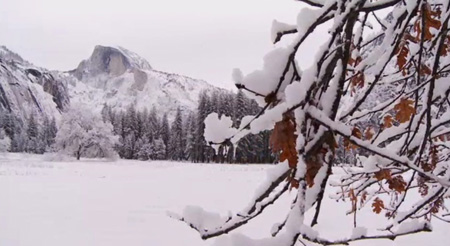
The author of this webpage, (written for my students), does not give any warranty, expressed or implied, nor assume any legal liability or responsibility for the accuracy, completeness, or usefulness of any information, product, or process included in this website or at websites linked to or from it. Users of information from this website assume all liability arising from such use.
